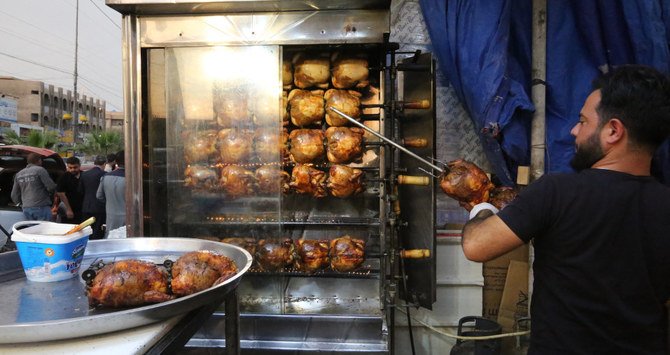-
Lockdown forces restaurant, cafe owners to sack a quarter of their employees
-
Corruption in Iraq has eaten up more than $450 billion in public funds since 2003
It’s well past the coronavirus curfew, but Seif and his waiters are still serving customers at his Baghdad restaurant, thanks to security forces they have paid to turn a blind eye.
After COVID-19 restrictions hammered his business last year, Seif said he decided to do what many of his neighbors in the capital’s central Karrada district were doing.
Despite the nightly 9 p.m. to 5 a.m. curfew, various security forces deployed in the area solicited bribes in exchange for allowing establishments to stay open, he said.
Like others AFP interviewed, Seif declined to provide his full name or the name of his restaurant for fear of reprisal.
“Each week, I have to give them 500,000 dinars (around $340),” he said — close to Iraq’s average monthly wage.
“Certain security force officers have become (like) business partners,” he added bitterly.
Restaurant and cafe owners were among the 65 percent of small and medium-sized businesses in Iraq that saw their revenues plummet during a spring lockdown last year.
The UN says such businesses had to sack a quarter of their employees and received no support from the oil-dependent state — itself facing an unprecedented fiscal crunch caused by low crude prices.
Seif had to shut for six months due to last year’s coronavirus lockdown.
Iraq officially counts some 22,000 restaurants and cafes, though many others operate unlicensed.
Ziad, a cafe owner on a Baghdad street famous for its restaurants, said he had given in to the pressure.
“I don’t see why I should be the only one the law applies to. All the cafes and restaurants around here pay bribes and stay open, so I did the same,” he said.
Iraq has officially recorded around 1,340,000 novel coronavirus cases and over 17,000 deaths since the start of its outbreak, though many cases go undetected due to low testing.
The country’s poverty rate has doubled to 40 percent during the pandemic, and nearly 40 percent of Iraqi youth are unemployed, according to the World Bank.
Another cafe owner, Abu Mohammed, said that when he asked fellow proprietors “why they hadn’t been fined, they told me they had ‘a connection’.”
Lacking such contacts of his own, he said he was still looking for the right person to pay off, since many officers from various agencies pass through his premises.
“I don’t know if by paying one of them, the others will forget me or will demand their share,” he said.
Nightclubs and other establishments also open late to packed crowds despite government restrictions on the number of people allowed in closed spaces.
Mask wearing and social distancing requirements are loosely observed.
“In normal times, we pay a commission to armed groups for our ‘protection’,” one nightclub owner said.
“Now we have to pay the security forces on top of it to stay open.”
Explosions targeting night venues and shops selling alcohol are not uncommon, as armed groups often linked to established parties and factions settle accounts with those who don’t pay up.
Police and soldiers, for their part, say they are just a cog in a corrupt system.
Officials have admitted that security force officers often buy their positions at a considerable price, and then ask their teams to “reimburse” them, which is done through extortion.
Corruption in Iraq has officially swallowed over $450 billion in public funds since dictator Saddam Hussein was toppled in 2003.
One high-ranking military official in Baghdad said he had transferred officers in a bid to tackle corruption, but that the problem was difficult to nail down.
“Cafe owners who complain are rare,” the official said.

